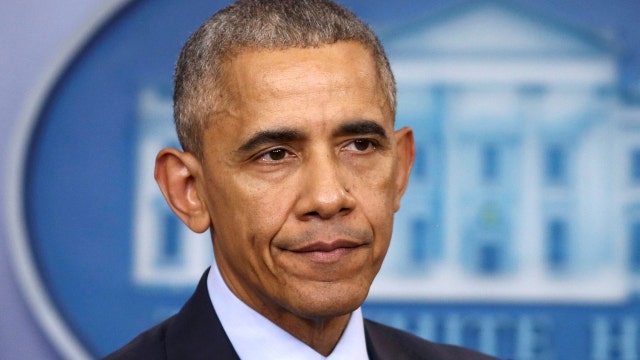President Obama on Tuesday ordered U.S.-owned waters in the Arctic Ocean and certain areas in the Atlantic Ocean placed "indefinitely" off-limits for future oil and gas leases, in a final fossil-fuel crackdown before he leaves office.
The move, intended to protect the area’s ecosystem, is a final push by Obama to seal his environmental legacy, and a possible way to bind the hands of his successor.
“Today, in partnership with our neighbors and allies in Canada, the United States is taking historic steps to build a strong Arctic economy, preserve a healthy Arctic ecosystem and protect our fragile Arctic waters, including designating the bulk of our Arctic water and certain areas in the Atlantic Ocean as indefinitely off limits to future oil and gas leasing,” the White House said in a statement, issued while Obama is on vacation with his family in Hawaii.
The White House announced the actions in conjunction with the government of Canadian Prime Minister Justin Trudeau, which also placed a moratorium on new oil and gas leasing in its Arctic waters, subject to periodic review.
The Atlantic waters placed off limits to new oil and gas leasing are 31 canyons stretching off the coast of New England south to Virginia.
Industry groups swiftly protested.
Independent Petroleum Association of America (IPAA) Senior Vice President Dan Naatz said in a statement the group was “extremely disappointed in President Obama’s eleventh hour decision to shut down economic development and lock away America’s true energy potential for communities that need it most."
Although the move uses executive powers, environmental groups are hoping the ban will be difficult for President-elect Donald Trump to reverse. The billionaire has repeatedly pledged to unleash the nation’s untapped oil and natural gas reserves.
Obama used a 1953 provision that allows the president to ban offshore leases in the outer Continental Shelf permanently. The administration has been considering opening an area of the Atlantic Coast to drill, but has slowly backed away from the idea, culminating in Tuesday’s announcement. Earlier this year, the administration removed potential Atlantic lease sales from its blueprint for offshore drilling. But that ban only applies to a five-year period starting in 2017, and could be more easily reversed by Trump in his own five-year blueprint.
Trump is looking to fill his administration with nominees who opposed Obama’s environmental agenda. He has tapped Environmental Protection Agency opponent Scott Pruitt to head the agency, and has picked former Texas Gov. Rick Perry to head the Department of Energy, which Perry once vowed to eliminate. Trump has called for more offshore drilling and to make the U.S. energy self-sufficient.
Some in the industry have expressed confidence the ban will not stand under the Trump administration, noting he can simply issue a new proclamation after taking office.
"There's no such thing as a permanent ban," Erik Milito, a policy director at the American Petroleum Institute, told The Associated Press.
However, Niel Lawrence, a senior attorney at the Natural Resources Defense Council, told the AP that the result of a Trump proclamation isn’t that simple, as while the statute says a president can withdraw waters from the country's leasing plans, "it doesn't say you can put back in."
If Trump does issue an order reversing Obama's proclamation, it would be up to environmental groups or others to challenge his actions in court. If he doesn't, then it would be up to Congress to intervene.
Fourteen senators had signed a letter calling on Obama to ban offshore drilling permanently. Sen. Robert Menendez, D-N.J., had said before the announcement that he doesn’t think future administrations can undo the order without congressional approval.
The Associated Press contributed to this report.





